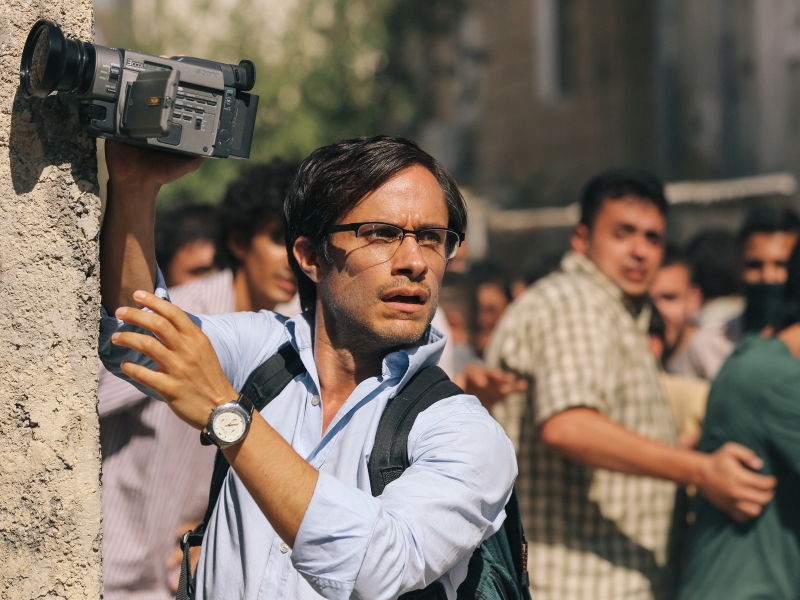The mood is largely optimistic in these opening scenes even as it’s clear that a dark turn is coming in the story. At one point, during a montage of demonstrations in Tehran, a web of hashtags like #democracy and #protest floats by on screen. The sense here is of a government that’s out of touch, and an opposition that’s the obvious future of the country.
It’s all pretty tepid until the movie turns to Bahari’s incarceration, at which point Stewart’s choices become more disconcerting. The issue is not necessarily one of treating Bahari’s story tastefully; in fact, Stewart may have been too tasteful here. He packs jokes into a horrific situation, but never any that come close to ruffling feathers. Instead, they’re predictable knocks against the kinds of insular interrogators and government officials that wouldn’t be able to recognize the Daily Show’s satire.
It’s also not necessarily a problem of Stewart’s choosing the wrong tone entirely. Rather, he vacillates between too many of them. When Stewart features news footage of a debate between Ahmadinejad and one of his main challengers, opposition leader Mir Hossein Mousavi, or real video of the violence against those protesting the contested election results, the most serious concerns surrounding Bahari’s arrest come into view. But in other moments, Stewart takes a more dismissive approach, treating Bahari’s interrogator, for example, as an unappreciated buffoon looking for recognition from his superiors. In those moments, Stewart seems to want to turn these men into trifling figures, refusing to give them even the benefit of serious treatment. There are times, too, when the film takes a more broadly inspirational tone, addressing itself to Bahari’s resolute spirit — itself an allegory, it would seem, for Iran’s quelled opposition.
One can imagine a film that combined these various approaches into a cohesive story, but in Rosewater they’re blindly tossed together, and the result neither portrays the suffering of Bahari’s incarceration adequately nor lampoons the absurdities of the situation.
Even if nothing in Rosewater makes you question Stewart’s good intentions in making the film, it’s hard to shake the the feeling that by taking a summer off from the Daily Show to film the movie in Jordan, Stewart performed the equivalent of parachute journalism and cobbled together what plays as a watered-down version of Bahari’s story.
There’s little chance you’ll emerge from Rosewater knowing much more about Iranian politics than when you started. The film admirably protests censorship and political repression, but it doesn’t push very hard to reveal new truths. It only superficially gets into what drove the protests Bahari was covering. And while it eventually acknowledges that the story of a foreign journalist with governments and international activists calling for his release says little about life for Iranians under the current regime, the admission comes late in the film and simply leaves it to other movies to dig deeper into the story.
And, of course, many have, including recent films like Manuscripts Don’t Burn and Closed Curtain, both made by Iranian dissident filmmakers who have worked in defiance of official bans. Those are stories that open a window onto a closed society. The usefulness of Rosewater, meanwhile, seems limited to telling the story of one journalist who crossed paths with a well-connected American.
Copyright 2014 NPR. To see more, visit http://www.npr.org/.
9(MDAxOTAwOTE4MDEyMTkxMDAzNjczZDljZA004))

9(MDAxOTAwOTE4MDEyMTkxMDAzNjczZDljZA004))

